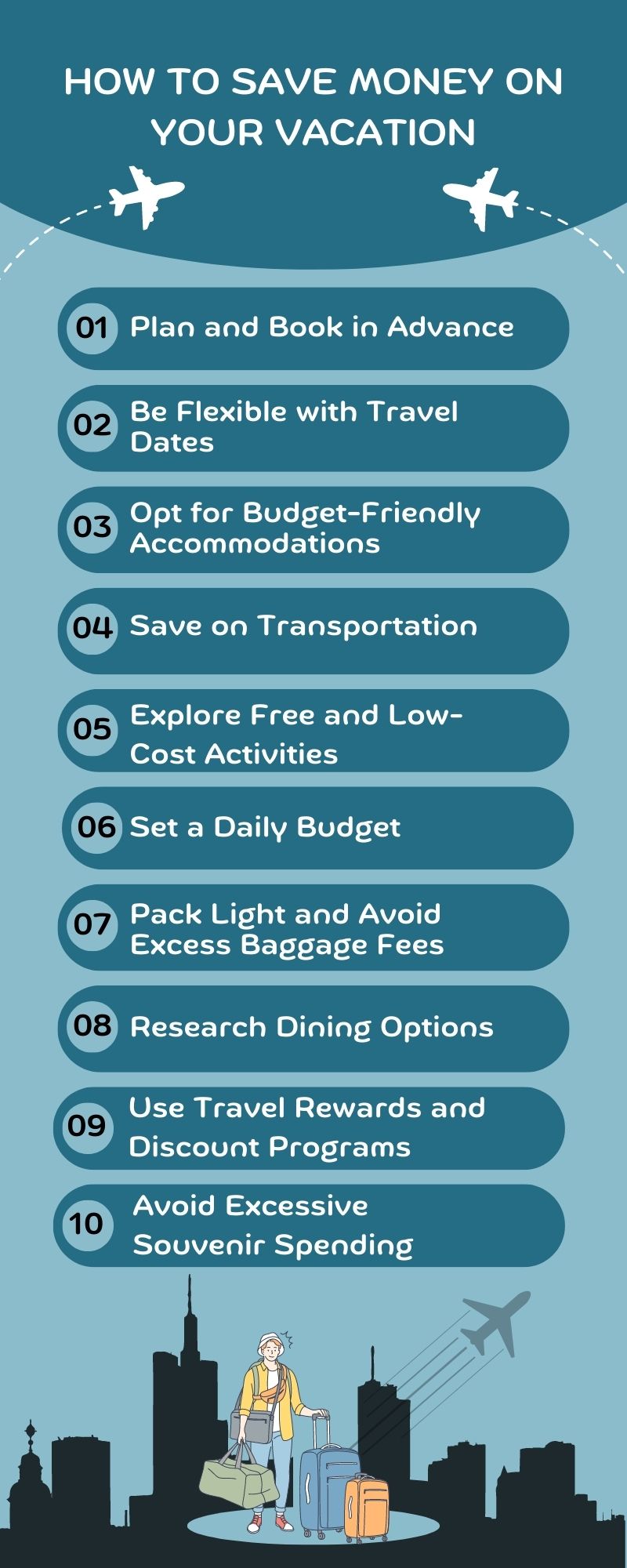The prospect of going on vacation is an exhilarating experience, but it can also drain your finances. However, you can enjoy a memorable trip while saving money with thoughtful planning and strategic choices. I have some practical strategies that may assist you in saving money on your vacation:

Plan and Book in Advance: Planning your vacation well in advance can help you secure the best deals and discounts. Research and compare flights, accommodations, and activity prices to find the best value for your money. Booking in advance can offer you various advantages. Early bird discounts and often available promotional offers.
Be Flexible with Travel Dates: Flexibility with your travel dates can lead to significant savings. Consider travelling during the off-peak season when prices are generally lower. Look for midweek flights and hotel stays, which are cheaper than weekends. By being flexible, you can capitalize on better deals and discounts.
Opt for Budget-Friendly Accommodations: Accommodations can be a significant expense during a vacation. Consider alternative options like vacation rentals, hostels, or guesthouses instead of expensive hotels. These alternatives often provide comfortable and affordable lodging options. Additionally, look for accommodations with kitchen facilities so you can save on dining expenses by preparing some meals yourself.
Save on Transportation: Transportation costs can quickly add up during a vacation. Research public transportation options at your destination and utilize them instead of relying solely on taxis or rental cars. Public transportation is often more cost-effective and can allow you to experience the local culture. Additionally, consider walking or biking in areas with good infrastructure to save on transportation costs.
Explore Free and Low-Cost Activities: If you want to save money while on vacation, a great strategy is to discover free or inexpensive activities to enjoy. Look for accessible attractions, museums with discounted admission days, or local festivals and events. Many destinations have beautiful parks, beaches, and hiking trails that you can explore at little to no cost. Take advantage of nature and enjoy the outdoors without breaking the bank.
Set a Daily Budget: Setting a daily budget for your vacation can help you stay on track with your spending. To manage your finances effectively, it is important to calculate your daily spending limit and distribute your funds accordingly. Then, monitor your spending and adjust, if necessary, to keep within your set limits.
Pack Light and Avoid Excess Baggage Fees: Packing light makes travelling more accessible and saves money. Many airlines charge hefty fees for excess baggage. Be mindful of airline weight and size restrictions and pack accordingly. Consider packing versatile clothing items that can be mixed and matched to create different outfits.
Research Dining Options: It is particularly important to consider if you dine out for all your meals. Research dining options at your destination and look for local eateries, street food, or affordable restaurants. These options often provide delicious and authentic meals at a fraction of the cost of touristy restaurants. Consider having a picnic or cooking some meals to save on dining expenses.
Use Travel Rewards and Discount Programs: Take advantage of travel rewards programs like airline or hotel loyalty programs to earn points and save on future trips. Accumulate points through your regular spending and redeem them for discounted or even free flights and accommodations. Look for discounts and coupons for attractions, tours, or restaurants through websites, apps, or travel guidebooks.
Avoid Excessive Souvenir Spending: Souvenirs are an ordinary expense during vacations, but they can quickly become a financial burden. Instead of buying expensive souvenirs, opt for meaningful and budget-friendly alternatives. Consider purchasing postcards, local crafts, or small sentimental items.
Implementing these intelligent strategies lets you enjoy a fantastic vacation without breaking the bank. Saving money doesn’t mean sacrificing fun and enjoyment; it requires careful planning, prioritizing value, and making conscious choices.


















